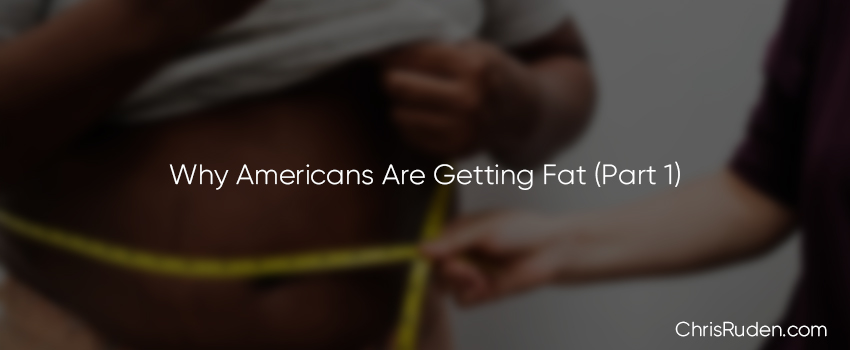Why Americans Are Getting Fat (Part 1)
Why We Are Getting Fat
Taxes and obesity– two things guaranteed to continually increase in the United States. And while I can’t even begin to explain taxes, I want to expose a few of the obesity-contributing factors as to why we are getting fat in the United States.
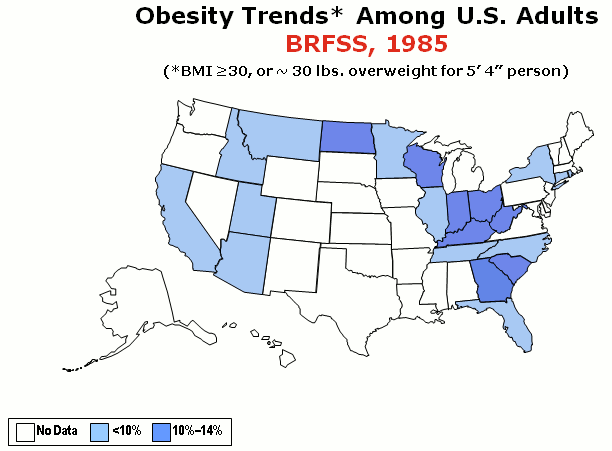

Why is it that we are getting fat as a nation year after year? People (including myself) are quick to point the finger at something and it is usually one of the following:
- We eat too much food
- We eat more carbs which causes more insulin, a fat storage hormone, secretion
- We eat too much fat/red meat /dairy
- We don’t exercise enough which makes us fat
All of these make some valid points towards the climbing BMI of our nation. Unfortunately, not one of these points fully address the causation and continuation of fat gain…fully.
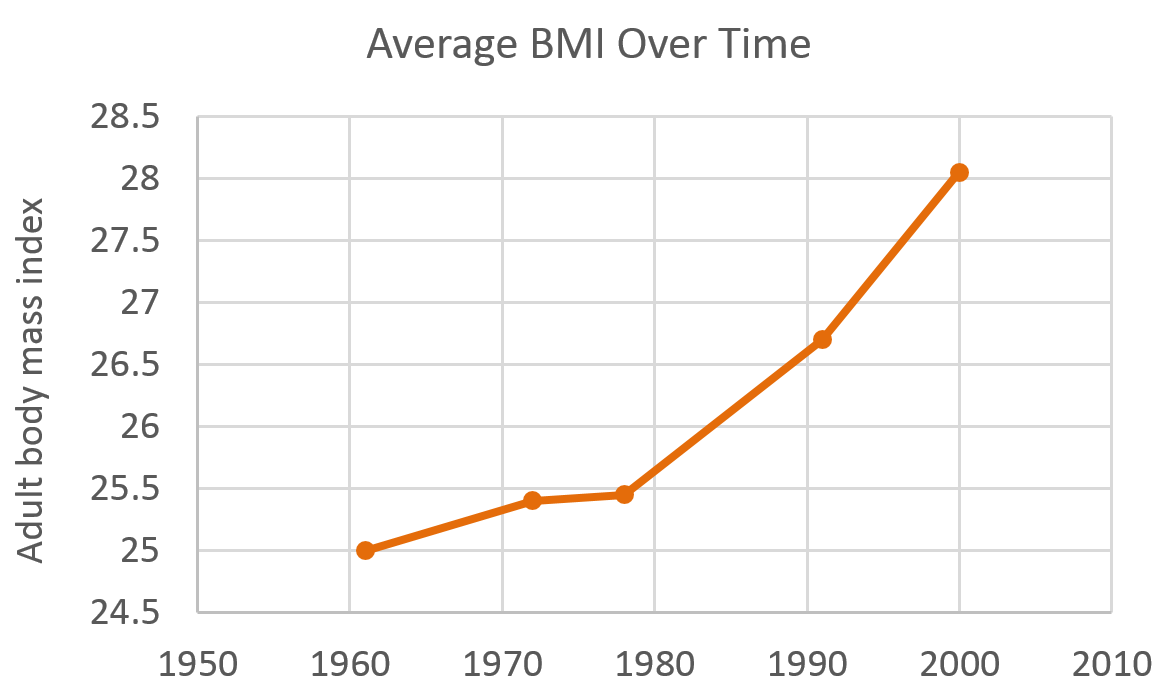

To really understand why pounds keep packing on, we need to stop pointing fingers and attempt to remove any bias for this review. I’ll be quite blunt in saying no one cares if your fat loss ideology is true or false. I don’t care if my theories are true or false. I care that we somehow stop or slow the obesity trend that is killing us– no matter what it takes.
Low-Fat, Carb Craze
In the 1970’s, the average American’s food intake ranged from 2100-2200 calories a day. Almost all meals were home cooked, carbs were eaten without fright as were fats, and obesity wasn’t a concerning trend.
Fast forward to 1976 when the low-fat craze began. Fat became public enemy number one and people tried to avoid anything with fat in hopes of being healthier and losing more weight.
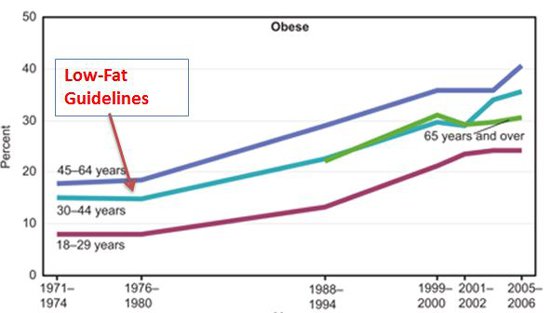

Within 10 years, people began buying endless amounts of low-fat, high-carb snacks, thinking “as long as there isn’t much fat, I can eat whatever I want”. Hell, even low fat cookies and cotton candy were a diet food back then, but God forbid some fat-riddled avocado because certainly that causes obesity.
I feel the low fat guidelines mislead people into thinking total food intake isn’t as important as total fat intake, causing a massive increase in food intake which is know as the main contributing factor to weight change.
We quickly realized fat doesn’t make you fat or directly cause heart disease as suspected.
Fat is a necessary macronutrient– one that you can’t live without. Fat regulates hormones and provides energy for you to live.


If you look at the chart above you were certainly see the rise in carb intake is linear (to a point) with the booming obesity epidemic. From this chart alone, most people will automatically tag carbs as the sole driver of obesity. But if you look from 1998-2013, there was a steady decline in carbohydrate intake (leaving us at the same carb intake of the 1980’s) but not a steady decline in obesity.
If carbs alone cause obesity, then why did obesity not drop?
While the whole carbs cause/don’t cause fat gain argument is still a huge debate, I find more often than not studies supporting both low carb high fat (LCHF) and high carb low fat (HCLF) diets for weight loss– given that they are in a calorie deficit and protein intake remains high . That means, after multiple metaanalysis studies, there is no significant, reliable source linking carb intake alone to obesity. I mean, the Okinawan people have the longest life expectancy and the traditional Okinawan diet was about 80 percent carbohydrates.
There are benefits for high carb and low carb but I will go into the on another article.
While carb consumption was a bigger problem in the 90’s and early 2000’s, it doesn’t seem to be the main culprit of weight gain. Added sugar is definitely a problem but there is an issue surrounding carbs that needs to be addressed.
Obesity Spike
The low-fat freak-out undoubtedly sparked a major increase in obesity…but not why you might think so.
Most people love to say something like “ SEE! They added carbs and took away fats and now everyone is obese; thus, carbs cause obesity”. Unfortunately, that is not the case.
The false acknowledgement of fat causing people to gain fat led people to think they could eat endless amounts of food as long as it wasn’t fatty foods.
Food intake increased and never came back down. Restaurants and fast food chains popped up like a disease and spread. The availability of food has increased 10 fold.
And once we found out fat could be added back into the diet as it doesn’t cause you to instantly become obese, we added it back with intensity. Only, we didn’t take away carbs to balance the equation.
Instead of replacing food, we simply added it.


Added fat intake increased by 28 percent over the course of the obesity epidemic, which can definintely be seen as an obesity-contributing factor because:
- Added fat is the most calorie-dense food on the planet.
- Added fat is one of the most effective ingredients for enhancing food palatability.
- Added fat has a very low satiety value per calorie.
- People eat more total calories when extra fat is added to their food.
- Added fat fattens a variety of non-human species, including mice, rats, dogs, cats, pigs, and monkeys, when added to their food.
While fat isn’t fattening when it’s eaten as part of whole foods with lower calorie density and high fiber or protein (meat, yogurt, avocados, nuts), a lot of research has converged on the conclusion that added fat is fattening.
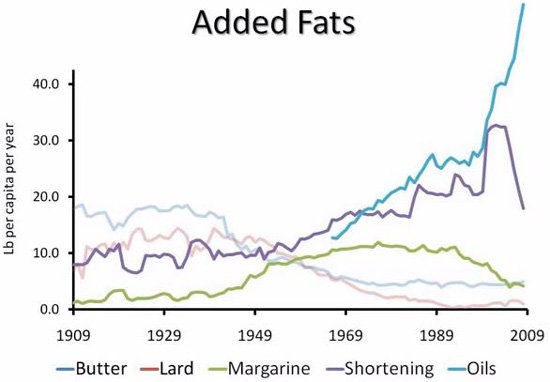

The rise of added fats was probably a contributor to the obesity epidemic, along with other diet and lifestyle factors. While fat isn’t necessarily fattening when it’s eaten as part of whole foods with lower calorie density and high fiber or protein (meat, yogurt, avocados, nuts), a lot of research has converged on the conclusion that added fat is fattening.
The obesity epidemic started in 1980 and the diabetes epidemic started around 1990.
Even though these diseases were almost unheard of before, they have now become the biggest health problems in the world, killing millions of people per year.
It is clear from the graph above, that these diseases have skyrocketed as animal fats have been replaced with shortening, margarine and processed vegetable oils.
The one thing we are sure of is that the MAIN factor in weight gain (there are multiple) is consuming more calories or energy than your body needs…and that is exactly what has been happening.
Calories…More Please
Shortly after the low-fat panic attack, calorie intake began to skyrocket. There may be many reasons for this calorie increase but I will focus on the two reasons I feel are most important:
- More eating out at restaurants and fast food
- More snacks and convenient, processed food
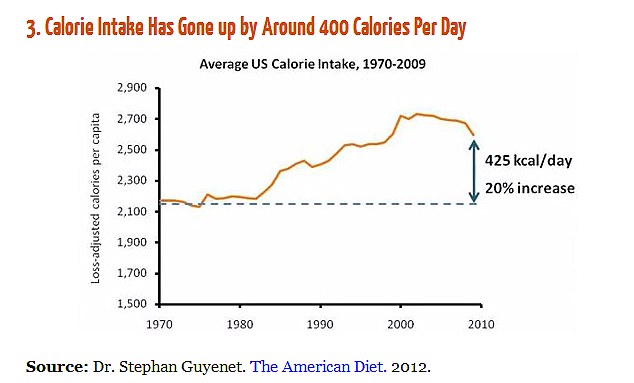

On average, we consume about 425 more calories a day (some grossly more, and some less) leading to a sizeable gain in weight over the course of a year. As you may know, a pound of fat is supposedly made up of about 3500 calories. By consuming 500 calories extra a day without increasing activity level, you can expect to gain around a pound a week (to a certain extent until your body creates a new maintenance level of calories).
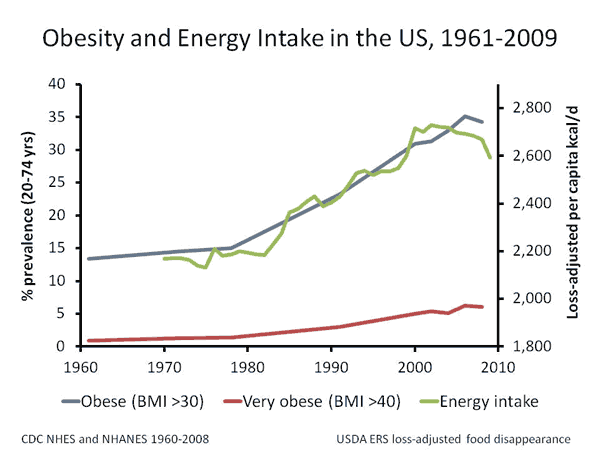

This method, referred to as the CICO method (calories in vs calories out) is not 100% explicative of weight gain and loss but does remain as a solid starting point in figuring out what may be causing weight change or lack thereof.
There is a very linear, almost identical trend showing the increase of sugar, processed foods, added fats, and total food consumption has mirrored the increase in obesity.
While we see the contributing factors from a calorie and macronutrient level, losing weight is not just for those who have strong will power. This increase in calories isn’t exactly coming from a great source like protein either. Most of this comes from processed food that is engineered to cause addiction.
There is an entirely different monster contributing to obesity and it is somewhat out of our control: Food politics.
(For more data on food intake, check out the USDA Economic Research Service )
Continue to Part 2: The Food Environment
*Registration for the February Fat Loss Challenge is almost over. If you need to lose 15 pounds or more and/or are diabetic, you need to check out the details free here
References:
- Johnson CL, Dohrmann SM, Burt VL, Mohadjer LK. National Health and Nutrition Examination Survey: Sample design, 2011–2014. National Center for Health Statistics. Vital Health Stat 2(162). 2014.
- Is Sugar Consumption Detrimental to Health? A Review of the Evidence 19952006 Critical Reviews in Food Science and Nutrition, Vol. 50, No. 1. (2010), pp. 1-19, doi:10.1080/10408390802248569 by C. H. S. Ruxton, E. J. Gardner, H. M. McNulty
- Effects of a low-fat diet compared with those of a high-monounsaturated fat diet on body weight, plasma lipids and lipoproteins, and glycemic control in type 2 diabetes. Am J Clin Nutr. 2004 Sep;80(3):668-73.
- Effects of isoenergetic overfeeding of either carbohydrate or fat in young men. Br J Nutr. 2000 Aug;84(2):233-45.
- High-fat diet-induced hyperglycemia and obesity in mice: differential effects of dietary oils. Metabolism. 1996 Dec;45(12):1539-46
- Composition of lipids in human serum and adipose tissue during prolonged feeding of a diet high in unsaturated fat. J Lipid Res. 1966 Jan;7(1):103-11.
- Adipose tissue biomarkers of fatty acid intake. Am J Clin Nutr. 2002 Oct;76(4):750-7.
- Linoleic acid and the pathogenesis of obesity. Prostaglandins Other Lipid Mediat. 2016 Jun 24. pii: S1098-8823(16)30036-3. doi: 10.1016/j.prostaglandins.2016.06.003. [Epub ahead of print]
-
Prevalence of Obesity Among Adults and Youth: United States, 2011–2014 Cynthia L. Ogden, Ph.D.; Margaret D. Carroll, M.S.P.H.; Cheryl D. Fryar, M.S.P.H.; and Katherine M. Flegal, Ph.D.

